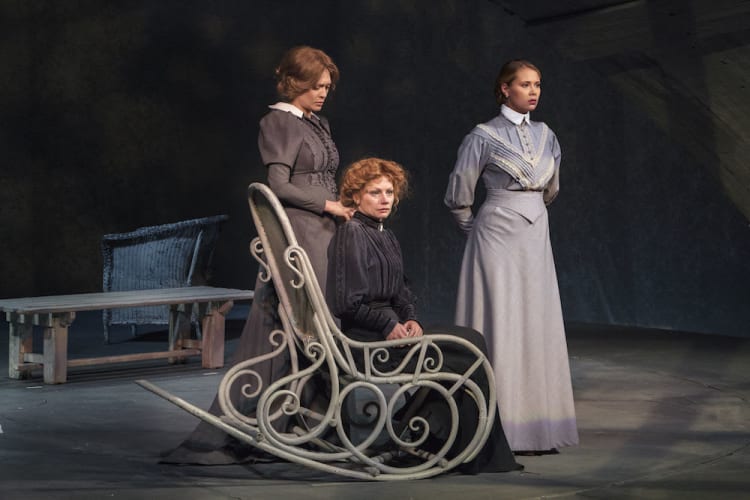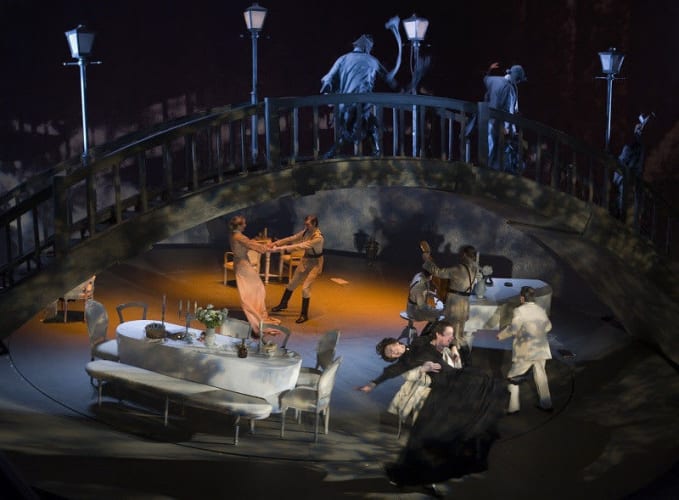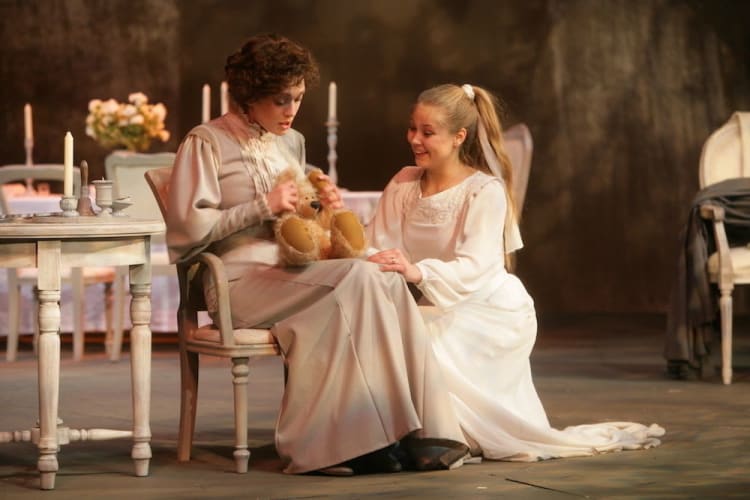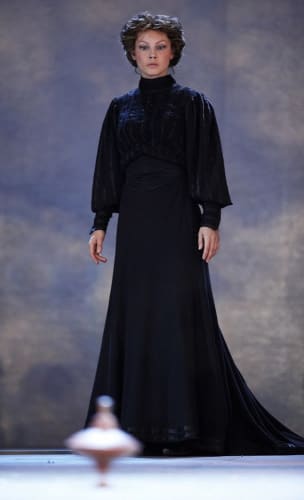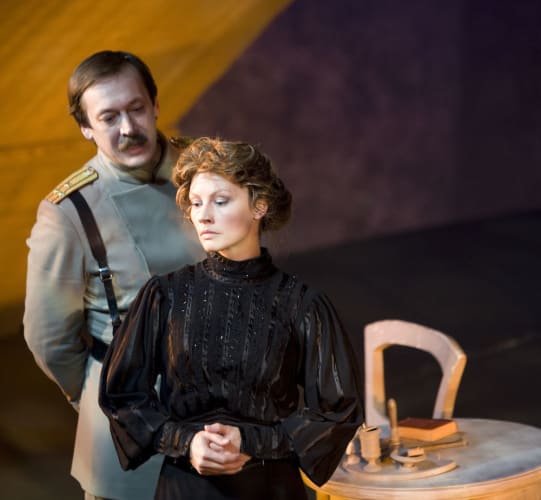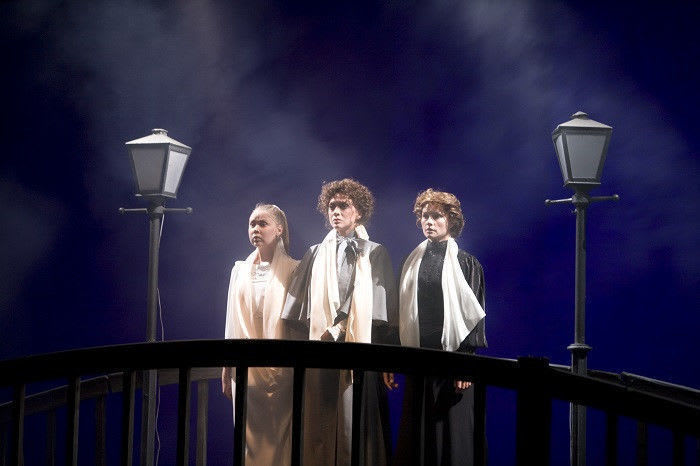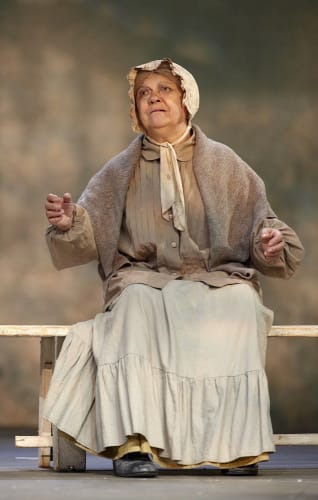The bridge and the spinning, raked revolve are intact, new members in the cast ring some changes, but the waltzing whirligig of monochrome time has come to a halt in a trapped-in-amber production that is regarded “as one of the seminal versions” of Anton Chekhov’s Three Sisters, written for and first performed at the Moscow Art Theatre (MXAT) in 1900.
Flies buzzing against a windowpane, under Chekhov’s microscope, their histrionics and philosophising, their longings and failed relationships, self-centred people, talk, talk, but does anyone listen? With the distance of time—and time is the subject and object of Chekhov’s work—one gets a feeling of looking at Three Sisters through the wrong end of the telescope.
Galina Volchek’s sincere period production gives a sense of nineteenth century Russia on the cusp of tumultuous events, but what about Konstantin’s cry for new forms in Seagull? There’s something of the wasteland symbolist in the so-called naturalist Chekhov (he admired Maeterlinck after all), which chimes with army doctor Chebutykin’s existential musings. “Maybe I don’t exist… If only I didn’t exist.” And in Solyony’s (Ilya Drevnov excellent) strange operatic posturing—is he autistic?
But, thank goodness for their clear delivery. Acoustics are not what they should be in the theatre and a few—Shamil Khamatov as Tuzenbach, Victoria Romanenko as Irina and Olga Drozdova as Olga—are at times inaudible in their authenticity. My companion finds the surtitles alienating, and in any case they break down a couple of times and are often slightly behind the dialogue.
In the interval, I hear someone say it’s Monty Python—never heard that response before, but it is apt. A dab hand at linguistic counterpoint, Chekhov with his wicked sense of humour, literary markers and subtle subtext is doing just that, sending his characters up with a straight face and a tender heart.
The three sisters play it Soviet realist straight, though Olga has a twinkle in her eye I don't recall; Vladislav Vetrov’s moustachioed Vershinin is so suspect there are titters in the house; and Sergey Yushkevich’s provincial Kulygin works hard at hamming up his erudition, speaking in English at one point...
Naturally there’ve been tweaks over the years. Going to his duel with Solyony, Tuzenbach in frock coat and black cravat could be Pushkin who died in a silly duel. In a masterstroke, Volchek turns that table on Solyony, fantasising that he’s Lermontov reincarnate, and also flags up Vershinin’s tale about the human condition—would we be happy if we got what we wanted?
That’s the pleasure of Chekhov, the nuances buried in his symphonic language. How life deludes us. Doctor Chebutykin (Anatoly Uzdensky getting the best applause) knows that. His is the voice of experience and that’s why he drowns it in drink. What does anything matter, what difference does it make... Chekhov was forty when he wrote these lines with only four years left to live.
How optimism is dashed: the absurdity of struggling, of hoping for a better future. Life takes the three sisters by the scuff of the neck and flings them into exhausted despair. In only a handful of years, Irina—the play opens with her jolly name-day celebrations—has learned not to expect anything from life apart from work to fill the void. If only we could have another go at life, Vershinin says.
How the seasons roll. Affairs of the heart are temporary sticking plasters, a distracting dream: Masha (Alyona Babenko) returns to her husband, who has patiently watched her passionate infatuation with family man lieutenant-colonel Vershinin, but will she ever play the piano again… Cuckolded, “how life deceives us” Andrei (Ilya Lykov) will turn into the cynical doctor.
Time is a cruel teacher even if there can be some fun along the way. The soldiers grab it where they can, as does Andrei’s caricatured vulgar wife Natalia (Yelena Plaksina on terrific form). And if we don't laugh at ourselves what chance have we got of getting through our allotted time.
Laughter through tears, that ambivalent tightrope we all walk, is famously applied to Chekhov’s work. That’s why it endures, but I’m with Konstantin on form. The language is music to my ears, but don't bury Chekhov in a nostalgic dynamic seen through the mist of time. His words ring for all time. It could be now. We never learn. Natalia’s confident lot are taking over the world.
Slava Zaitsev and Pyotr Kirillov’s design is a perfect setting for Three Sisters, "The Girls on the Bridge" of Edvard Munch’s 1901 painting, a location for "The Scream", too, a bridge to nowhere, for lovers’ trysts and partings. Damir Ismagilov bathes it in golden lighting, and Mieczyslaw Weinberg’s musical soundscape spins the turntable of emotion.
I can never get enough of Chekhov, he’s my man, and, I think, Moscow Art Theatre School trained director Volchek’s too, but my companion says no more, he’s had enough. The audience seems divided between the two of us—some leave during the interval, some give flowers.
